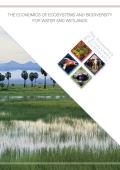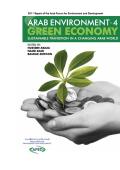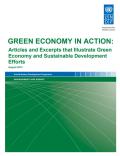
This TEEB for Water and Wetlands report underlines the fundamental importance of wetlands in the water cycle and in addressing water objectives reflected in the Rio+20 agreement, the Millennium Development Goals and forthcoming post 2015 Sustainable Development Goals. The report presents insights on both critical water-related ecosystem services and also on the wider ecosystem services from wetlands, in order to encourage additional policy momentum, business commitment, and investment in the conservation, restoration, and wise use of wetlands.
TEEB Water and Wetlands aims to show how recognizing, demonstrating, and capturing the values of ecosystem services related to water and wetlands can lead to better informed, more efficient, and fairer decision making. Appreciating the values of wetlands to both society and the economy can help inform and facilitate political commitment to policy solutions.


The Green Economy is one in which the vital linkages among the economy, society, and environment are taken into account. This selection of articles and excerpts emerged in response to the need to fill the knowledge gap on practical, concrete, and on the ground green economy country experience. It is in this spirit that the articles and excerpts included in this publication have been selected: to provide information and knowledge for policy and decision makers and practitioners on the positive implications of greening some priority sectors, including job creation, resource efficiency, and generally contribution to sustainable development through an extensive review of scientific publications and magazines.
The sectors analysed are water, agriculture, energy, industry, business, ecosystems, technology, waste management. The report contains several case studies, including from China, Egypt, the United Arab Emirates, the United Kingdom and Europe.
This report reviews the economic and environmental consequences of resource inefficiency in Asia and the Pacific and some of its underlying causes. It examines a range of technical, policy, and institutional responses to encourage corporations and consumers alike to adopt more resource-efficient behaviors, with particular attention to the vital role governments must play in creating incentive structures, encouraging research and development for new technologies, improving institutions and information exchange, and other measures to move the region’s economies toward greater resource efficiency. This analysis is a contribution to the global G8 3R Initiative, which seeks to promote the “reduce, reuse, recycle” approach to waste management. While many of the specific strategies described are not new, the report should contribute to an understanding of the underlying reasons behind resource inefficiency, tools for its analysis, and specific interventions tailored to the Asia and Pacific context.
The report includes case studies from China, India, Japan, Lao, Nepal, Philippines and Thailand.
The need to reform water policies is as urgent as ever. Water is essential for economic growth, human health, and the environment. Yet governments around the world face significant challenges in managing their water resources effectively. The problems are multiple and complex: billions of people are still without access to safe water and adequate sanitation; competition for water is increasing among the different uses and users; and major investment is required to maintain and improve water infrastructure in OECD and non-OECD countries. Despite progress on many fronts, governments around the world are still confronted with the need to reform their existing water policies in order to meet current objectives and future challenges. Building on the water challenges identified by the OECD Environment Outlook to 2050, this report examines three fundamental areas that need to be addressed whatever reform agendas are pursued by governments: financing of the water sector; the governance and institutional arrangements that are in place; and coherence between water policies and policies in place in other sectors of the economy.
